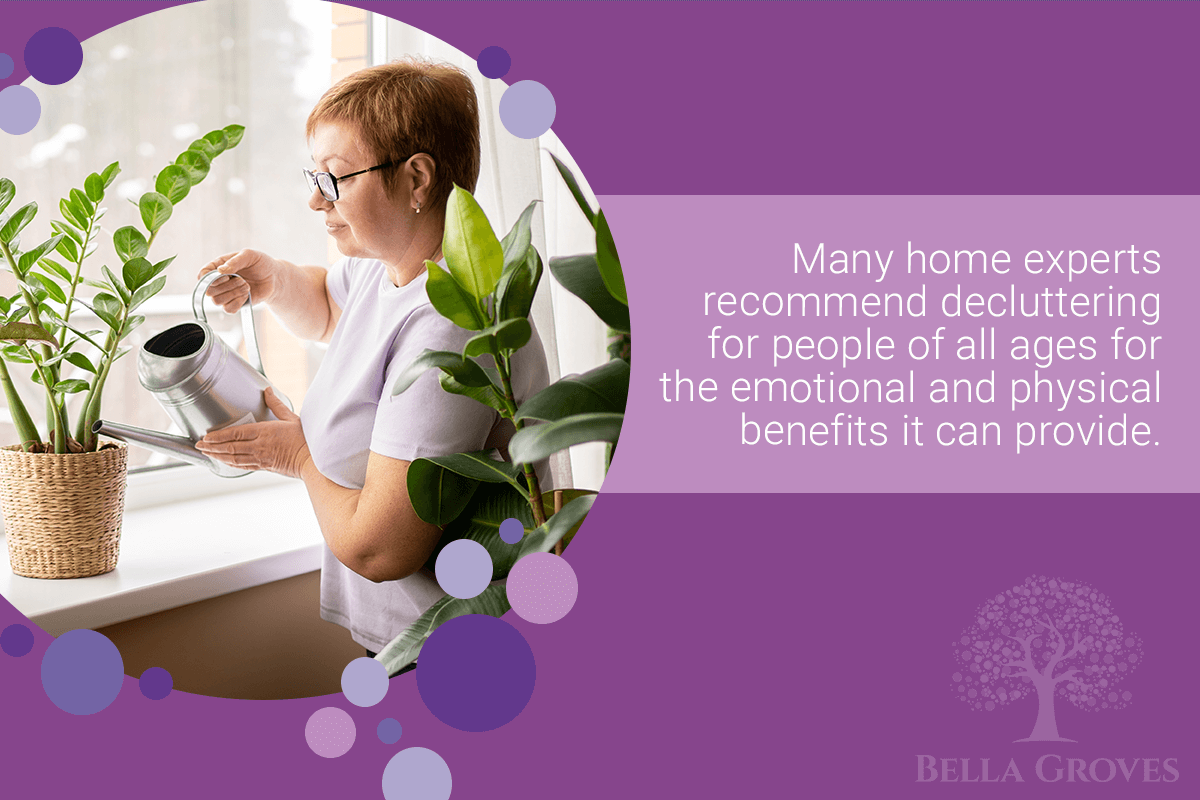
Benefits of Spring Cleaning: How to Promote Safety and Mental Wellness
Spring cleaning isn’t just about dusting off the winter frost; it’s a powerful ritual that can breathe new life and order into our spaces. For those caring for a person living with dementia, this annual custom holds even greater significance. The act of decluttering, organizing, and refreshing surroundings can promote not just physical safety but also mental well-being — a vital lifeline in the constant journey of dementia care.
As care partners, spring cleaning is an opportunity to reassess your loved one’s environment, implement safety measures, and curate a surrounding that ignites familiar memories and comforting sensations.
Bella Groves is here to help families and care partners recognize the spring season as a pivotal moment of care and renewal. Let’s explore the benefits of spring cleaning and how it can transform living spaces into sanctuaries that can support your loved one living with dementia.
Create a Safe Space
Clutter can cause distress and pose risks for those living with dementia. For example, studies have found a common link between dementia and the act of gathering different objects; a person living with dementia might start to stockpile things in their home, whether they are unwilling to part with things, unsure of whether or not these objects might become important later on, or simply unaware of the presence of clutter.
The process of decluttering reduces potential hazards and confusion while also creating a space that’s not only visually welcoming but also safely navigable.
A simple walkway can become a minefield of hazards to someone with dementia. Start by identifying and removing any objects that could be tripping risks, like electronic cords or rugs and furniture. Next, secure rugs with non-slip pads and clear any pathways in high-traffic areas of the home.
Consistent organization in the home environment aids in recognition and ease of use and can also make things more familiar and convenient for your loved one. Label drawers, cupboards, and other storage spaces in a clear, consistent manner. Utilize color-coding and even orientation-specific organization, especially if your loved one has difficulties with sensory aspects.
Purposeful Cleaning
Spring cleaning for individuals living with dementia is an opportunity to rekindle the joy and stability that familiarity can bring. Each act of polishing and purging is a step toward rediscovery and comfort!
While sorting through possessions, isolate items of personal significance — a favorite chair, a treasured memento, or a much-loved book. These items can serve as touchstones by grounding individuals in their own stories. Place them in prominent, accessible spots to help reinforce identity and connection.
Sensory stimulation in the home can reduce anxiety, increase communication with your loved one, and even improve mood and boost cognitive function. A hint of lavender from fresh laundry or the gentle hum of a familiar tune can drastically quiet internal storms. Introduce these sensory elements throughout the cleaning process to create a multi-dimensional, calming experience.
Assign and encourage simple cleaning tasks that engage your loved one in the cleaning process. Wiping windows, folding laundry, or dusting are excellent repetitive actions that are not only productive but can also stimulate memory and cognition. These purposeful activities can improve focus and act as gentle exercises for the mind.
Communicate with Grace
Effective communication can do wonders for care partners and loved ones, especially during a ritual like spring cleaning.
Use plain language to convey messages during the spring cleaning. Keep instructions short and to the point. Phrases like “Let’s put this away” or “This goes on that shelf” are much clearer than complex or multiple-step directions.
Touch, when appropriate and welcomed, often communicates more effectively than words. As you guide the cleaning process, offer your hand or a gentle touch on the shoulder. Your physical presence can provide a source of comfort and security.
Encourage active participation, no matter how small the task might seem. Involvement can empower your loved one, reinforcing their role in maintaining their household. Every fold of a towel or sweep of a broom becomes a shared achievement.
Self-Care is Part of Renewal and New Beginnings
Among the flurry of tasks and actions, care partners must remember to care for themselves. The spring season should be as revitalizing for you as it is for the person in your care.
Rest during this period isn’t a luxury but a necessity. Take breaks, even if brief, to recharge. These moments of respite can prevent burnout and allow you, in turn, to be a better caregiver.
You are not alone. Seek support from family, friends, or support groups. Sharing experiences with others who understand the journey can provide emotional support and a wealth of practical advice.
Amidst the seriousness of your role, don’t underestimate the value of humor. Laughter is a potent tool for stress relief. Find the lighter side of tasks and let it be a reminder of the enduring bond you share.
The act of cleaning can reflect life’s recurring cycles, offering new beginnings and refreshed perspectives. Your thorough efforts as a care partner do not go unnoticed and do not happen in a vacuum. They deliver environments that promote safety and joy and ignite a sense of accomplishment.
At Bella Groves, we understand the importance of rituals like spring cleaning, and our team is always here to share helpful dementia resources at every step of your journey.
If you have questions about your dementia care journey, we invite you to call us at (830) 323-0440 or email us at hello@bellagroves.com.


